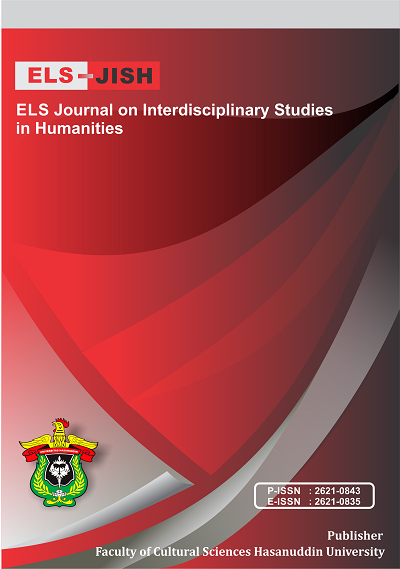Cultivating Gratitude: Essential Korean Thankfulness Phrases for Indonesian Learners
DOI:
https://doi.org/10.34050/elsjish.v7i2.34881Keywords:
Gratitude, Korean Thankfulness Phrases, Indonesian LearnersAbstract
This research explores various ways of expressing gratitude in the Korean language and their effects on Indonesian learners of Korean. Through the analysis of language variations involving expressions of gratitude in Korean, it highlights differences in formality, familiarity, and intensity of gratitude expressed. This research utilized a descriptive qualitative method. The data for this study were obtained from online books and related articles. The results indicate that understanding various expressions of gratitude has a positive impact on communication skills, politeness, cultural adaptation, and social integration for Indonesian learners. By expanding their knowledge of the Korean language and culture, learners can more easily interact with native speakers, strengthen interpersonal relationships, and gain a deeper understanding of Korean culture as a whole. The implications of this research provide insights into the importance of understanding language variations in social and cultural contexts, as well as their implications for language learning and cross-cultural integration.
References
Adinda, R., & Said, I. M. (2023). Phonological Interference of Indonesian Consonants Into Korean. Theory and Practice in Language Studies, 13(1), 137-144.
Andini, C., Yassi, A. H., & Sukmawaty. (2021). The use of honorifics in English and Buginese with special reference to bone language: A comparative study. International Journal of Innovative Science and Research Technology, 6(7), 873-877.
Bachriani, B., Yassi, A. H., & Rahman, F. (2018). A Comparative Study of Euphemism in English and Buginese: Pragmatic Stylistics Contexts. Parenting, 38, 5.
Cahyaningrum, A. (2023). English Pronunciation by Korean EFL Learners on Hilokal Language Educational Application. Elsya: Journal of English Language Studies, 5(1), 1-17.
Dalyan, M., Syarifuddin, Yulandari, Mastang, Suma, M., Sosrohadi, S., & Andini, C. (2024). Harmony and Sustainability: Traditional Ecological Knowledge Systems of the Kaluppini Indigenous People. International Journal of Religion, 5(6), 82-92.
Denzin, N. K., & Lincoln, Y. S. (Eds.). (2011). The Sage handbook of qualitative research. sage.
Eisenberg, J., Glikson, E., & Lisak, A. (2021). Multicultural virtual team performance: The impact of media choice and language diversity. Small Group Research, 52(5), 507-534.
Leskelä, L., Mustajoki, A., & Piehl, A. (2022). Easy and plain languages as special cases of linguistic tailoring and standard language varieties. Nordic Journal of Linguistics, 45(2), 194-213.
Levinson, S. C. (2014). Pragmatics as the Origin of Recursion. Language and recursion, 3-13.
Miaschi, A., Sarti, G., Brunato, D., Dell’Orletta, F., & Venturi, G. (2022). Probing Linguistic Knowledge in Italian Neural Language Models across Language Varieties. IJCoL. Italian Journal of Computational Linguistics, 8(8-1).
Rahman, F., & Weda, S. (2018). Students’ perceptions in appreciating English literary works through critical comment: A case study at Hasanuddin University and Universitas Negeri Makassar. Asian EFL Journal, 20(3), 149-172.
Rahman, F., & Weda, S. (2019). Linguistic deviation and the rhetoric figures in Shakespeare’s selected plays. XLinguage" European Scientific Language Journal", 12(1), 37-52.
Rochani, H. (2023, August). Variety of Languages in Terms of Formality in Kompas. com Online Media Daili News as Indonesian Language Teaching Materials. In International Conference on Learning and Advanced Education (ICOLAE 2022) (pp. 894-901). Atlantis Press.
Sosrohadi, S., & Nur, T. (2020). Kesinambungan Bahasa Ibu dan Loyalitas Penutur Bahasa Melayu Betawi di Setu Babakan: Kajian tentang Pemertahanan Bahasa. Populis: Jurnal Sosial dan Humaniora, 5(2), 260-272.
Sukmawaty, S., Andini, C., & Rahman, F. F. (2022). The Shift of Honorifics due to The Promotion As A Government Official: Comparative Study. ELS Journal on Interdisciplinary Studies in Humanities, 5(1), 166-176.
Sulastri, T., & Alleynisa, D. (2024). Conversion and Revitalization of Buddhist Otera in Japan: A Religiosity-Historicity Study. International Journal of Religion, 5(6), 63-72.
Tardy, C. M., Reed, K., Slinkard, J. R., & LaMance, R. (2021). Exploring Global Englishes content and language variation in an academic writing course. TESOL Journal, 12(1), e00520.
Wang, L., Gonzalez, P. D., Lau, P. L., Vaughan, E. L., & Costa, M. F. (2023). “Dando gracias”: Gratitude, social connectedness, and subjective happiness among bilingual Latinx college students. Journal of Latinx Psychology, 11(3), 203.
Wilang, J. D. (2022). Gratitude in Foreign Language Learning. Arab World English Journal, 13(2), 338-352.
Downloads
Published
How to Cite
Issue
Section
License
Copyright (c) 2024 Kwon Youngsun

This work is licensed under a Creative Commons Attribution-ShareAlike 4.0 International License.






